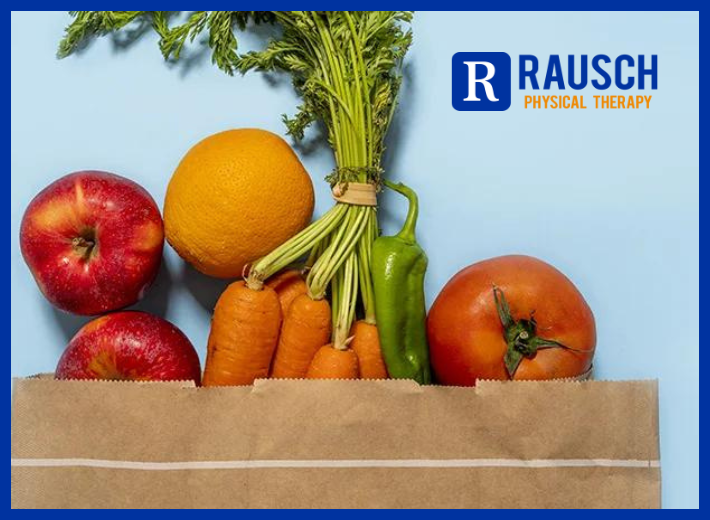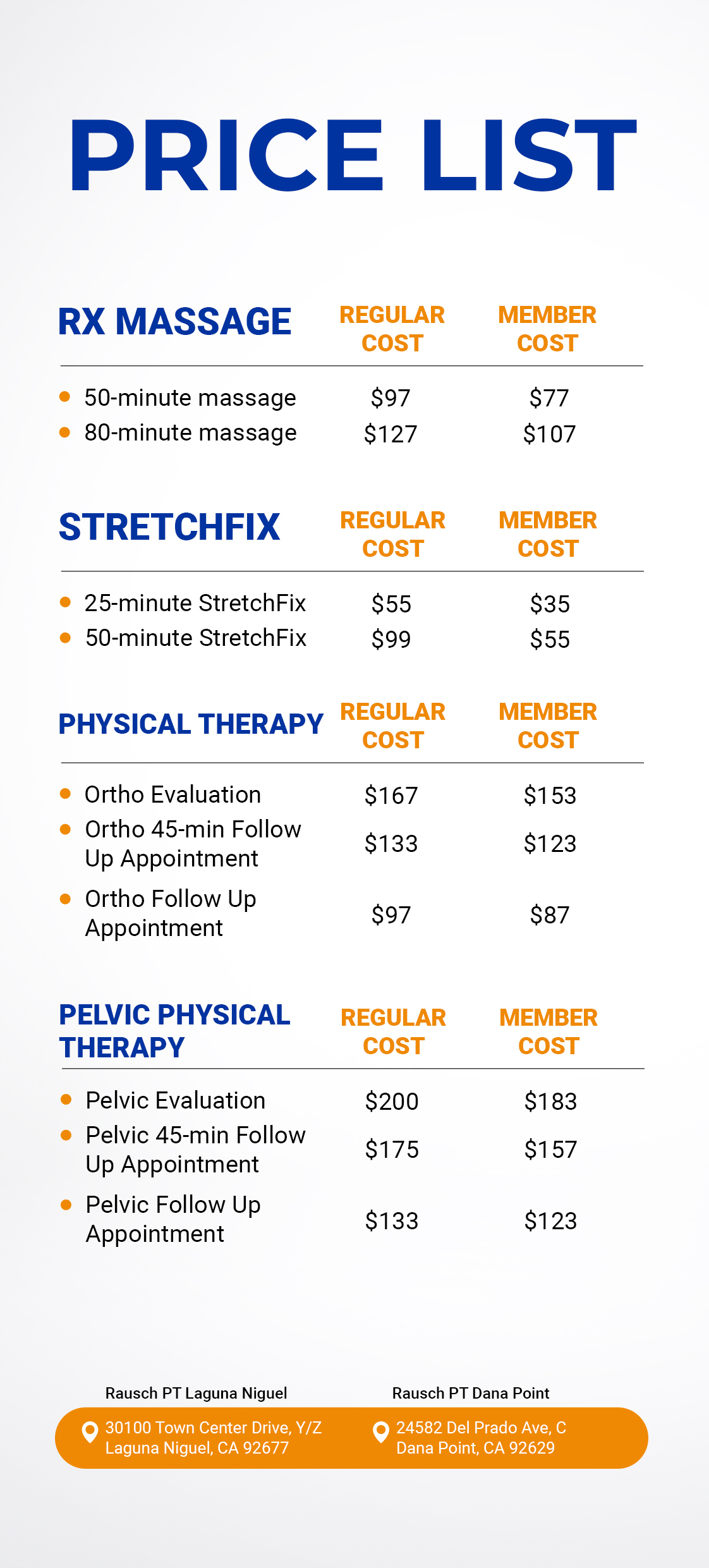1. Bring Mindfulness Into Your Day Stress and anxiety don’t just affect your mind—they impact your nervous system, sleep, recovery, and even how your body experiences pain. Mindfulness and meditation,
Why is Nutrition Important?
February 1, 2023 1:40 pm / Category: Rausch Physical Therapy

The link between good health and good nutrition is well established. Whether you are a competing athlete, a weekend sports player, or a dedicated daily exerciser, the foundation for improved performance is a nutritionally adequate diet. Learn more about calories and macronutrients to maintain strength and energy to compete and stay injury-free.
Athletes will have different nutritional needs compared with the general public. They may require more calories and macronutrients to maintain strength and energy to compete at their optimum level.
In addition to consuming sufficient amounts of calories and macronutrients, athletes may also require more vitamins, minerals, and other nutrients for peak recovery and performance.
Moreover, they may need to consider meal timing and ensure adequate hydration.
In this article, we discuss macronutrient and micronutrient needs of athletes and look at calories, meal timing, and how to tailor requirements to specific sports. We also give meal examples for breakfast, lunch, and dinner.
Why is nutrition important?
Nutrition is essential for supporting an athlete’s general health and their training needs.
Having a suitable diet provides a person with enough energy and nutrients to meet the demands of training and exercise. In addition to helping a person perform optimally, it facilitates recovery.
Athletes may need to consider:
- their caloric needs
- macronutrient amounts and ratios
- meal and snack timings
- vitamins and minerals for recovery and performance
- hydration
Tailoring these considerations to an athlete’s body weight and composition, the amount of time spent training, and the type of sport they do can improve their performance.
Macronutrients
The Dietary Guidelines for Americans, 2020–2025 suggest that the optimal macronutrient ratios for adults are as follows:
- Carbohydrates: 45–65% of calories
- Protein: 10–35% of calories
- Fat: 20–35% of calories
The International Sports Sciences Association (ISSA) notes that people can adjust these ratios based on the goal of physical activity.
For example, an endurance athlete would increase the amount of carbohydrates they eat, while a strength athlete would increase their protein intake.
According to a 2018 review by the International Society of Sports Nutrition (ISSN), typical macronutrient ratios for athletes are as follows:
Carbohydrates
Carbohydrates receive a great deal of attention in sports nutrition due to the vital role they play in athletic performance.
Carbohydrates are typically the preferable fuel source for many athletes, particularly for high intensity and long duration exercise. This is because they supply ample glycogen storage and blood glucose to fuel the demands of exercise.
To maintain liver and muscle glycogen stores, athletes will need different amounts of carbohydrates depending on their exercise volume.
For moderate amounts of intense training, defined as 2–3 hours per day of intense exercise performed 5–6 times per week, the ISSN suggests consuming 5–8 grams per kilogram (g/kg) of body weight, or 250–1,200 g, of carbohydrates per day for athletes who weigh 50–150 kg.
For high volume intense training, defined as 3–6 hours per day of intense training in 1–2 daily workouts 5–6 days per week, the ISSN recommends 8–10 g/kg of body weight, or 400–1,500 g, of carbohydrates per day for athletes weighing 50–150 kg.
For example, an athlete weighing 150 kg who performs high volume intense training would look to consume roughly 1,200–1,500 g of carbohydrates.
Healthy carbohydrates for an athlete’s diet may include whole grains, such as brown rice, quinoa, oats, and pasta, and starchy vegetables, such as potatoes.
Protein
Protein also plays an essential role in sports nutrition, as it provides the body with the necessary amount of amino acids to help build and repair muscles and tissues.
Athletes doing intense training may benefit from ingesting more than two times the recommended daily amount (RDA)Trusted Source of protein in their diet.
For example, the dietary reference intake for adult females is 46 g, and for adult males — 56 g. That is why it may be beneficial for athletes to consume nearer to 92 g and 112 g of protein, respectively.
The ISSA suggests that many athletes can safely consume 2 g of protein per 1 kg of body weight daily, compared with the RDA of 0.8 g/kg.
The ISSN also notes that optimal protein intake may vary from 1.2 to 2.0 g/kg of body weight per day.
Higher amounts of protein can help athletes avoid protein catabolism and slow recovery, which the ISSN notes can contribute to injuries and muscle wasting over time.
For moderate amounts of intense training, an athlete should consume 1.2–2 g of protein per 1 kg of body weight, which translates into 60–300 g of protein per day for an athlete weighing 50–150 kg.
For high volume intense training, the ISSN suggests 1.7–2.2 g of protein per 1 kg of body weight per day, or 85–330 g of protein for an athlete weighing 50–150 kg.
Healthy protein sources include:
- lean meat and poultry
- fish and seafood
- eggs and dairy products
- beans and lentils
- nuts and seeds
- soy, including tofu and tempeh
Fats are essential in the diet to maintain bodily processes, such as hormone metabolism and neurotransmitter function.
Including healthy fats in the diet also helps satiety and can serve as a concentrated fuel source for athletes with high energy demands.
The ISSN recommends athletes consume moderate fat intake, representing around 30% of daily calories. However, they can safely consume up to 50% of their daily calories as fat to meet higher volume training needs.
Athletes seeking to decrease their body fat may reduce fat intake to 20% of their daily calories.
Some athletes may choose to eat a ketogenic diet and consume higher amounts of fats. However, the ISSN review indicates there is not sufficient evidence to support the diet’s effectiveness.
Healthy fat sources include oily fish, olive oil, avocados, nuts, and seeds.
Micronutrients, supplements, and hydration

People can usually achieve adequate intakes of essential vitamins and minerals by eating a varied, balanced diet.
Some athletes may choose to take vitamin or mineral supplements or ergogenic aids, such as creatine. The ISSN recommends that consumers evaluate the validity and scientific merit of claims that manufacturers make about dietary supplements.
There is little evidence to support the efficacy or safety of many dietary supplements, including:
- adenosine 5′-triphosphate
- branched-chain amino acids
- phosphatidic acid
- glutamine
- arginine
However, scientists have shown that other ergogenic aids, such as caffeine and creatine monohydrate, are safe and effective for athletes.
It is important to be aware that some athletic associations ban the use of certain nutritional supplements.
Moreover, athletes should ensure they maintain adequate hydration. According to the ISSN and other sports nutrition experts, when a person loses 2% or more of their body weight through sweat, it can significantly impair their performance.
Given that sweat losses are a combination of fluids and electrolytes, such as sodium and potassium, athletes may choose to and benefit from using sports drinks, milk, or both to meet some of their hydration needs.
Sufficient calories
Athletes require sufficient calorie intake to match their energy expenditure through activity.
The ISSN suggests that athletes training intensely for 2–6 hours per day 5–6 days of the week may burn over 600–1200 calories per hour while exercising.
As a result, athletes engaging in this level of activity may require 40–70 calories per 1 kg of body weight per day, compared with the average less active individual, who typically requires 25–35 calories per 1 kg of body weight daily.
According to the ISSN, athletes weighing 50–100 kg may require 2,000–7,000 calories per day. It also notes that athletes weighing 100–150 kg may need to consume 6,000–12,000 calories daily to meet training demands.
Meal timing
The timing of meals and snacks can be vital to an athlete’s performance. The timing and content of meals can help support training goals, reduce fatigue, and help optimize body composition.
Guidelines for the timing and amount of nutrition will vary depending on the type of athlete.
For example, the ISSN advises strength athletes consume carbohydrates and protein or protein on its own up to 4 hours before and up to 2 hours after exercise.
The American College of Sports Medicine (ACSM) also notes the importance of consuming protein both before and after exercise for strength athletes.
By contrast, endurance athletes would need to consume mostly carbohydrates and a small amount of protein roughly 1–4 hours before exercise.
Both the ISSN and ACSM emphasize the role of meal timing in optimizing recovery and performance and recommend athletes space nutrient intake evenly throughout the day, every 3–4 hours.
Some people may find that consuming meals too close to the beginning of exercise can cause digestive discomfort. It is therefore important to eat an appropriate amount and not exercise too quickly after eating.
Are you ready to live your best life? When you choose PT, you choose more movement and better health. Time for a pain-free — and a pill-free — life! Don’t waste any more of your time in pain. Contact our team today at 949-276-5401. To get health and wellness updates and learn about what we have to offer ongoing, Join our Facebook community.
Reference: [https://www.medicalnewstoday.com/articles/nutrition-for-athletes]





